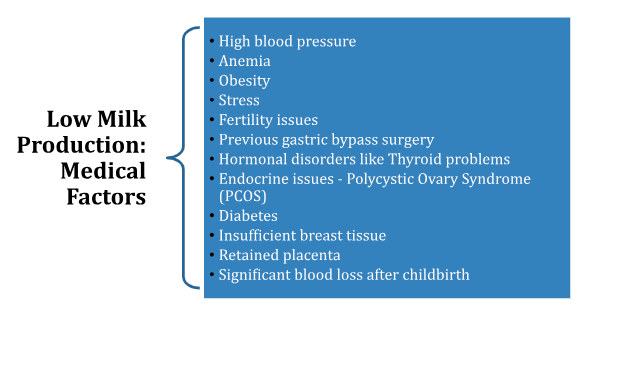
Breastfeeding is a rewarding journey for both mothers and babies. But, many new, first-time moms may find it difficult to produce enough breast milk! The natural ways to increase breast milk production for breastfeeding mothers include frequent food intake, adjusting schedules, and living healthily. Reasons for low milk production can vary, from different feeding times and smoking to health issues like diabetes and high blood pressure. This blog covers reasons for low breast milk production and offers advice on foods that increase breast milk during breastfeeding (diet for lactating mother).
Reasons for Low Milk Production
Factors that can lead to low milk production include:
-
Infrequent nursing sessions
-
Short feeding times
-
Medications for colds and flu
-
Past breast surgeries
-
Giving supplemental feeds outside of breastfeeding can signal the body not to make more milk
-
Smoking
-
High consumption of alcohol or caffeine
-
Having hormonal birth control before a baby is 6-8 weeks old
-
Using estrogen-containing birth control while breastfeeding
Certain medical conditions can also contribute to low breast milk production in breastfeeding mothers.

Consult our gynaecologist in Salem if you need to know the precise reason for less breast milk and get treated for it.
Foods to Increase Breast Milk During Breastfeeding
The following foods increase breast milk production (healthy diet for breastfeeding mothers) and are readily available in everyday life.
1. Whole grains
Whole grains are nutrient-dense and have been shown to stimulate prolactin, a vital hormone in breast milk production. Barley and brown rice can be included in several recipes to produce a nutritious and satisfying diet that will boost breast milk supply.
2. Oats
Oats are a rich source of iron and are used in a variety of dishes, including Oat Milk Matcha. Oat-based foods can significantly increase breast milk for lactating mothers. Insufficient iron levels have been shown to limit breast milk production, so eat your oatmeal while you can!
3. Lean meat
Any lean meat is an excellent source of iron and protein, which has been shown to improve milk production. Eating lean meat when breastfeeding is suggested to provide energy for you and your baby.
4. Garlic
Research suggests that including garlic and other aromatic substances in your diet may lead to increased milk production. Because of this, garlic is a popular meal that many nursing mothers swear by! Garlic is an excellent addition to any good dish and simple food to adopt into your life that can also aid in lactation.
5. Apricots
Pack apricots and other dried fruits for a mid-day snack. Dried fruits are high in nutrients, including tryptophan, which has been shown to raise prolactin levels.
6. Herbs
Adding healthy herbs to your diet can increase your milk production.
-
Fenugreek aromatic seeds are the most commonly used herbs to increase milk production. Fenugreek contains estrogen-like chemicals and is beneficial for mothers.
-
Add holy basil herb to your pasta recipe for a delicious taste. Also, it is believed to improve milk supply.
-
Fresh ginger is beneficial and complements any cuisine. It has been related to enhanced milk production and aids in the milk letdown process.
7. Nuts
Almonds and cashews stimulate milk production. After nursing, eat a handful of cashews and almonds or prepare a powder to add to your smoothies.
8. Flaxseed
Flaxseed contains phytoestrogens, which impact breastfeeding. Flaxseeds can be sprinkled on delicious salads or mixed into dessert dishes for an added nutritional boost.
9. Brewer's yeast
Brewer's yeast is a recognised galactagogue. However, there is little scientific proof that it works to increase milk production. Brewer's yeast can be found in beer, bread, and dietary supplements.
10. Shatavari Kalpa
Shatavari, also known as wild asparagus, is a reproductive tonic, as well as a digestive aid and adaptogen. It is available in all medical stores and can be blended with milk or any other drink.
A balanced diet that includes a variety of nutritional foods along with proper rest post-delivery can significantly increase breast milk production! “Skin-to-skin” contact between the mother and baby is another very crucial aspect of breastfeeding and is associated with improved milk production by releasing oxytocin hormone. So, spend enough time cuddling and holding your baby without any barriers as this will also help create emotional bonds between you and your newborn.
Consult our gynaecology Hospital in Salem if you want to learn more about how to increase breast milk during pregnancy.
FAQ's
Signs your baby is hungry include:
-
They move their head from side to side
-
Suck on their hands and fists
-
Open their mouth
-
Stick out their tongue
-
Pucker their lips as if to suck
-
Nuzzle against mom's breasts
-
Show the rooting reflex
The following lifestyle and routine changes may help a person to produce more milk:
-
Reduce stress
-
Practice skin-to-skin contact with the baby during the first few days
-
Drink at least 2-3 litres of water per day
-
Consume caffeine moderately
-
Avoid smoking
-
Stay well-rested
-
Have three nutritious meals per day
If your milk production is low and the baby stays hungry, you should discuss it with your gynaecologist for advice on supplements as well as diet and lifestyle modifications. Every mom’s breastfeeding experience is different, so don't hesitate to seek help to make your breastfeeding journey easier.





















 5 Min Read
5 Min Read







__Its_Type_and_Benefits.png)






